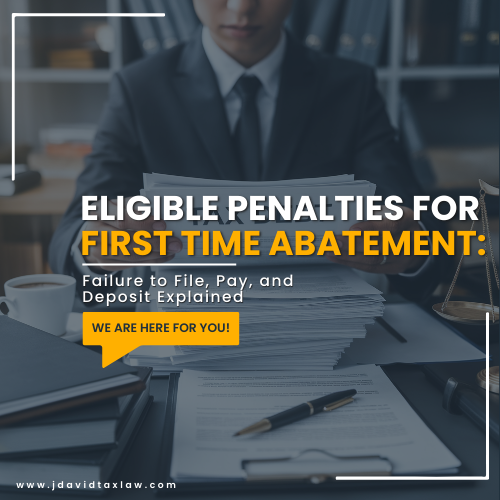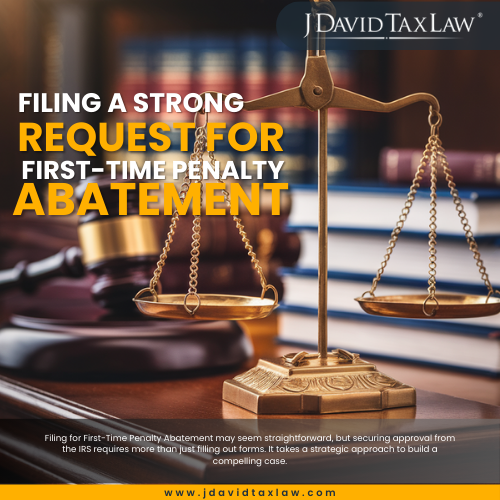
Learn how to qualify for First Time Abate, including failure-to-file, failure-to-pay, and failure-to-deposit penalties. Call our taxation experts (888) 342-9436





Our law firm, J David Tax Law LLC, is highly regarded as one of the top tax levy law firms in North Carolina. We have proven expertise and a track record of successfully helping individuals and businesses resolve their tax levy issues through personalized consultation and effective solutions. Our top tax levy lawyers are here to help you understand what a tax levy entails, what to expect, and how you can protect your financial interests.
So what is a tax levy? A tax levy is an action taken by the government, specifically the IRS or the North Carolina Department of Revenue (NCDOR), to legally seize a taxpayer’s property or assets to fulfill an outstanding tax debt. This means that if you fail to address your tax obligations, the taxing authorities have the power to enforce collection actions such as levying your bank accounts, garnishing your wages, or placing liens on your property.
Tax levies are serious matters that you should never underestimate. Receiving this notice can heavily impact your financial stability and hinder your ability to meet your daily living expenses. Thus, it is best to take immediate action when facing a potential tax levy to prevent further financial burdens and protect your assets. Take note that both federal and state laws have varied governing taxation. While IRS levies follow federal guidelines, State tax agencies like NCDOR have their own set of rules and procedures regarding levying taxpayer assets. It is highly recommended to seek professional guidance from an experienced tax levy attorney who specializes in dealing with levies and resolving tax debt issues.
Imagine you are a small business owner operating in North Carolina and due to some unforeseen economic downturns or cash flow issues, you fell behind on paying your state taxes. If left unresolved, the IRS will immediately file a tax levy against you. This could result in freezing your business bank account or seizing other assets necessary for the operation of your enterprise.
We know that receiving a tax levy notice can be alarming, leaving taxpayers wondering how they ended up in such a predicament. Several circumstances can lead to the issuance of a tax levy by government agencies like the IRS. Here are some common reasons that can help individuals and businesses take proactive measures to prevent or resolve potential levies.
Receiving a notice of a tax levy in your mailbox is an alarming experience for any individual or business in North Carolina. Getting your assets and properties seized can act as a means of collecting unpaid taxes. It can affect various aspects of your financial and personal life in many ways.
One of the immediate consequences of a tax levy is the freezing of your bank accounts. A frozen bank account means that you will be unable to access any funds in those accounts until the levy is resolved. This can disrupt your day-to-day activities, making it difficult to pay bills, cover living expenses, or even conduct basic financial transactions. In addition, the IRS has the authority to garnish your wages or legally withhold a portion of your earnings until it covers all your tax debt.
A tax levy also has the potential to damage your credit score. The IRS or state tax authority may file a Notice of Federal Tax Lien against you, which becomes a public record and negatively impacts your creditworthiness. This can make it challenging to secure loans, obtain favorable interest rates, or even rent an apartment.
For a business owner, facing an intent to levy from the IRS has severe repercussions in terms of operations. The seizure of assets such as equipment or inventory can disrupt your ability to operate effectively and generate income. In the worst-case scenario, it may also impact your reputation within the business community. This leads to financial strain, and employee dissatisfaction, and affects your overall business performance.
Receiving a notice of levy from the IRS signifies that the government has legal permission to seize your assets to satisfy a tax debt. However, always remember that tax discrepancies like this are not a no-hope case. There are steps you can take to bring a solution to this tax dispute and protect your property. Below are the key approaches to take once you receive a notice of levy:
Contact an experienced tax levy lawyer who specializes in resolving tax matters. A skilled J. David Tax Law attorney will assess your situation, examine the validity of the Notice of Levy, and guide you through the resolution process. They will act as your counselor to protect your rights and advocate for the best outcome on your behalf.
Once you have engaged legal representation, they will negotiate with the IRS to find a suitable resolution for your tax debt. This may involve setting up an installment agreement, where you pay your tax debt in monthly installments over an extended period of time. Alternatively, if you are facing financial difficulty, your attorney may recommend options such as an offer in compromise or currently not collectible status to lessen the burden on your part.
For instance, let’s say you owe $20,000 in back taxes and you don’t have neither work nor resources to pay the full amount upfront. Your tax levy lawyer may work with the IRS to establish installment agreements where you make monthly payments of $500 over a period of 40 months as a settlement.
During this negotiation make sure to provide accurate and thorough documentation of your financial situation to support your case. This includes providing proof of income and expenses, bank statements, tax audits and any other relevant financial records. If necessary, your attorney may file an appeal on your behalf if there are valid grounds to challenge the Notice of Levy. This could involve disputing the amount owed or demonstrating that the levy would cause undue financial hardship.
Throughout this entire process, it is critical to maintain open communication with your tax levy lawyer and follow their guidance. They will ensure that all necessary paperwork is properly filed, deadlines are met, and negotiations proceed smoothly.
Our tax relief attorneys specialize in tax problems and tax debt resolutions
Get started with a 100% free consultation

Learn how to qualify for First Time Abate, including failure-to-file, failure-to-pay, and failure-to-deposit penalties. Call our taxation experts (888) 342-9436

Get expert help filing a strong IRS First-Time Penalty Abatement request with our top tax attorneys for penalty relief. Call at (888) 342-9436 for free consultation

IRS First-Time Penalty Abatement can significantly reduce penalties. Our tax attorneys will file IRS Form 843 on your behalf. Call us today at (888) 342-9436.